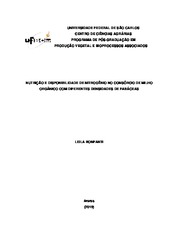Search
Now showing items 1-10 of 16
Avaliação de cultivares de rúcula e produção de sementes em cultivo orgânico
(Universidade Federal de São Carlos, 2019-02-25)
The production of rocket in Brazil, whether in conventional or organic cultivation uses seeds whose production comes from the conventional system, and there is no availability of seed produced in organic cultivation. The ...
Estudo sobre uso de novos citrandarins como porta-enxertos para laranja pera
(Universidade Federal de São Carlos, 2019-05-31)
Currently, the most of the citrus plants in the Brazil are on the rootstocks Rangpur lime and Swingle citrumelo, which may put at risk the Brazilian citriculture by the use of few genotypes. The use of other rootstocks ...
Leveduras como agentes de controle de Alternaria alternata em tomates no pós-colheita: mecanismos, resistência a estresses e formulação
(Universidade Federal de São Carlos, 2019-03-27)
The fungus Alternaria alternata causes rot in several post-harvest crops, limiting commercialization and causing damage to the entire agricultural production chain. The use of biological control agents has been an alternative ...
Extração de quitosana a partir de resíduo de camarão e seu efeito sobre leveduras do bioetanol
(Universidade Federal de São Carlos, 2019-01-18)
Chitosan is a biopolymer widely used in agriculture and in the food, medical and pharmaceutical industries. It is obtained by the deacetylation of chitin, extracted from the carapace of crustaceans or fungal mycelia. Despite ...
Podridão abacaxi da cana-de-açúcar: reação de variedades, controle químico e diversidade patogênica
(Universidade Federal de São Carlos, 2019-05-22)
Brazil is the world's largest producer of sugarcane, and its main products are sugar, ethanol and biomass. With the high demand for its products, there was a need to plant it all year round. Thus sugarcane pineapple disease, ...
Processo integrado de eletrocoagulação e cultivo mixotrófico de Desmodesmus subspicatus em vinhaça de cana-de-açúcar
(Universidade Federal de São Carlos, 2019-06-25)
Brazil is the largest sugarcane ethanol biofuel producer of the world. The productive process generates a considerable quantity of vinasse, its main wastewater. Therefore, the vinasse disposal is one of the major challenges ...
Efeito do 4-etilfenol sobre o crescimento e capacidade fermentativa da linhagem industrial de Saccharomyces cerevisiae PE-2
(Universidade Federal de São Carlos, 2019-02-26)
One of the main contaminating yeasts of ethanol production in Brazil is the species Dekkera bruxellensis. It is able to produce volatile phenolic compounds such as 4-vinylphenol and 4-ethylphenol from hydroxycinnamic acids ...
Desempenho de lima ácida Tahiti sobre diferentes porta-enxertos
(Universidade Federal de São Carlos, 2019-06-26)
The Tahiti acid lime, popularly known in Brazil as Tahiti acid lime, is one of the most produced fruits in the state of São Paulo, with the northwest region as the main producer pole. However, there are many losses due to ...
Distribuição espacial de espécies arbóreas na fisiologia de cafeeiros e qualidade de grãos e bebida
(Universidade Federal de São Carlos, 2019-04-26)
Coffee is an important Brazilian commodity. With global climatic changes and consuming market evolution. Shading coffee bushes is gaining notoriety, once shade trees protect coffee bushes from environmental variations and ...
Nutrição e disponibilidade de nitrogênio no consórcio de milho orgânico com diferentes densidades de fabáceas
(Universidade Federal de São Carlos, 2019-02-19)
The intercropping corn with green manures of the Fabaceae family has been studied as an alternative to supply nitrogen (N), via biological fixation (NBF). Increasing soil organic matter contents and nutrient cycling. ...








